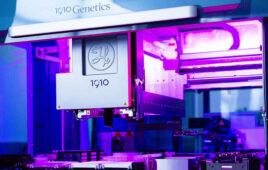The federal government is launching a very different kind of cancer study that will assign patients drugs based on what genes drive their tumors rather than the type.
The National Cancer Institute’s NCI-MATCH trial will be a massive precision medicine experiment at more than 2,400 sites around the country.
Starting in July, about 3,000 patients will have their tumor genes sequenced to see what mutations or pathways fuel their disease. About 1,000 patients whose tumor characteristics most closely match one of the 20 or so gene-targeting drugs offered in the study will be put into groups of about 30 patients to get that drug.
“The goal is really to try to get the information faster, so when we see responses we can expand rapidly” and offer the drug more widely, said Dr. Douglas Lowy, the Cancer Institute’s acting director.
Details of the study were revealed Monday at an American Society of Clinical Oncology conference in Chicago.
It is based on the growing realization that many cancers share the same gene mutations or pathways to grow. So a drug that targets one of these for a specific cancer, such as breast, may work against other types, such as lung.
“We’re getting to the lowest common denominator” of a cancer, said Dr. Otis Brawley, chief medical officer of the American Cancer Society, which has no role in the study but praised the effort. “You might end up with 30 people, all with different kinds of cancer, getting the same drug.”
Those eligible for the study will be adults with tumors or lymphomas worsened or spread despite at least one standard treatment. Fresh biopsies will be taken and sent to the University of Texas MD Anderson Cancer Center in Houston for quality checks, then sent to one of four labs around the country that will sequence the DNA.
All the labs will use tests from Thermo Fisher Scientific of Waltham, Massachusetts, to check for 143 cancer genes and more than 4,000 mutations. The whole process should take less than two weeks. Gene testing and the drugs will be free to patients.
“We’re hoping that a substantial minority of the patients that are tested will actually have rare or uncommon cancers” so more can be learned about what genes fuel them, Lowy said.
The study will be headed by Dr. Keith Flaherty at Massachusetts General Hospital.
Dr. Richard Pazdur, cancer drugs chief at the Food and Drug Administration, warned that although everyone hopes that targeting drugs to gene mutations will improve survival, “this may be far more complex than we realize.”
The FDA has never approved a drug that was not aimed at a specific tumor type such as breast cancer, but if a drug shows promise for a particular pathway involved in many tumor types, it could be approved for that use, he said.
Also on Monday, the oncology society discussed details of a study it will launch for patients with advanced cancers who lack treatment options now. It will offer patients “off label” access to various drugs already used for other tumor types or purposes, and collect information on how they fare.
So far, AstraZeneca, Bristol-Myers Squibb, Eli Lilly and Company, Genentech and Pfizer have agreed to provide at least 13 drugs, which will be free to study participants.
Filed Under: Genomics/Proteomics




